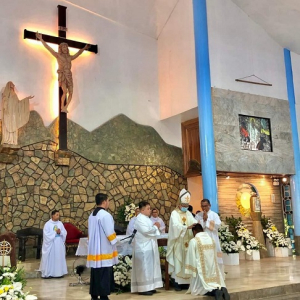Peter MALONE
Professions and Ordinations, Names, Dates and Pictures
Professions and Ordinations, Names, Dates and Pictures
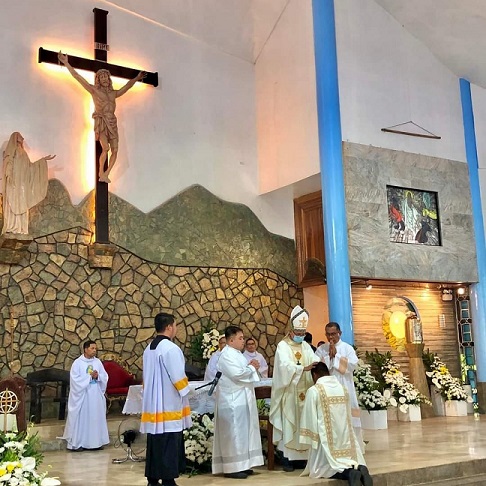
Philippines, August 17th 2023

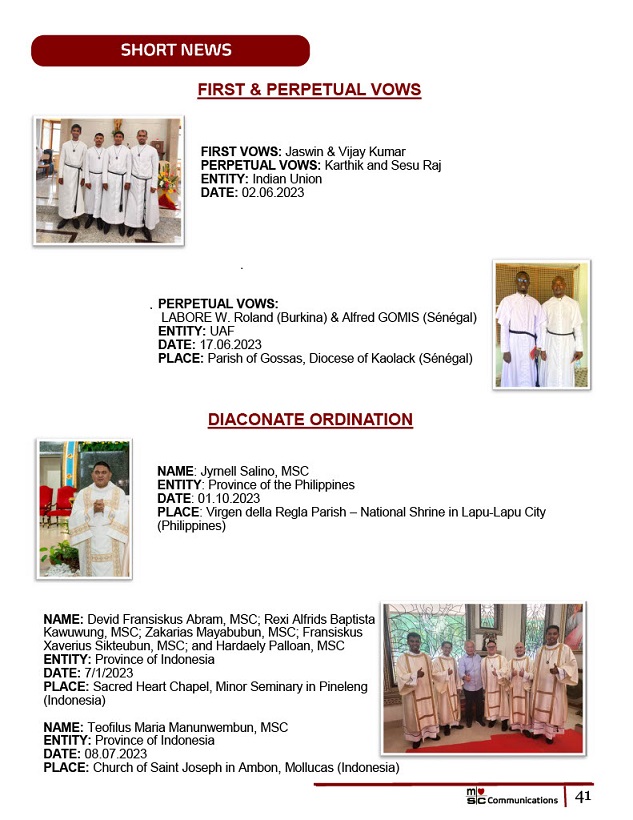
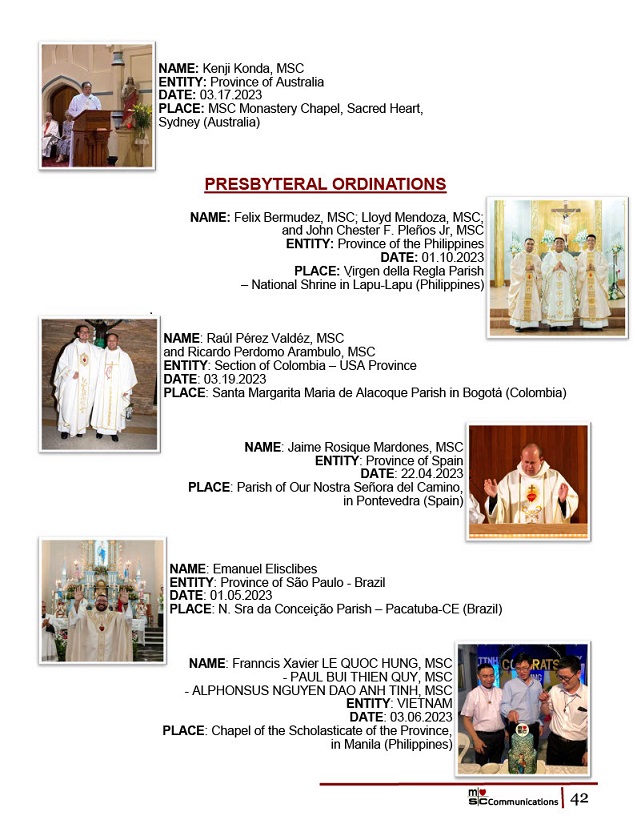
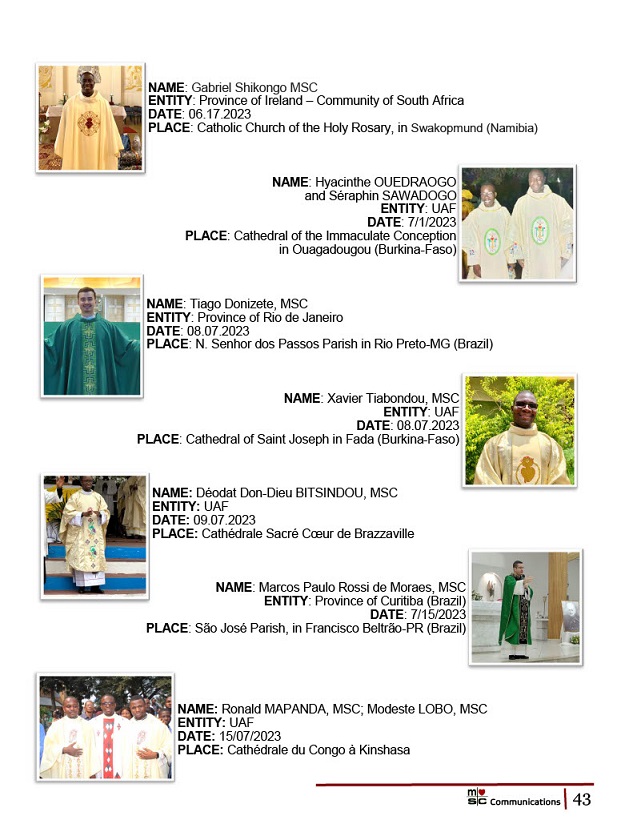
Gran Turismo
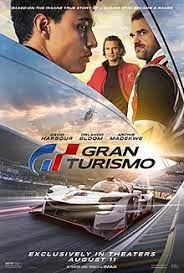
GRAN TURISMO
US, 2023, 135 minutes, Colour.
David Harbour, Orlando Bloom, Archie Madekwe, Takehiro Hira, Darren Barnett, Geri Halliwell Horner, Djimon Hounsou.
Directed by Neill Blomkamp.
2 ¼ hours of high adrenaline excitement for those sitting comfortably in cinema seats! This is a film for racing car enthusiasts, Formula 1, PlayStation fans, in fact, for all those who love cars and driving, especially at high speeds. Which means, of course, that it is not for those who have problems and ideological difficulties with Formula 1, and who see cars simply as a vehicle for getting from one place to another.
Speaking of Formula 1, it is fair to say that this story of racing driver success follows the well-known formula for sports films. But, while fastidious comments include the word predictable, those who enjoy the film expect this kind of story, identify with the characters, identify with the hopes, the trials, the successes.
Not everyone is familiar with PlayStation and computer games (though that demographic is increasing, many getting older because of their by now long familiarity with computer games). This film was produced by PlayStation and is a huge promotion for Nissan. And, it is based on a true story although the central character is somewhat fictionalised in terms of his success. However, there in the final credits, as so often nowadays, are photos of the actual driver, Jann Mardenborough, his trainer Jack Salter, his parents, family, juxtaposed with the pictures of Archie Madekwe who plays him here. And we are informed that the actual Jann Mardenborough did all the stunts for the film’s action sequences (and co-produced the film). The film has been directed by South African, Neill Blomkopf who came to prominence with District 9, and science fiction films, Elysium and Chappie.
There are some initial explanations of the Japanese origin of the computer game, Gran Turismo, its popularity and success, and we are introduced to Danny Moore, a Nissan promoter, with what seems a rather wild idea of having computer champions become actual racing drivers. We are introduced to the young Jann, skilled at playing Gran Turismo down in Cardiff. His father, champion footballer (played by Djimon Hounsou), his supportive mother (played by Geri Halliwell Horner, of Spice Girl fame), but his father protective and cautious, wanting his son to have a good job. But, driving is what he wants. Danny Moore organises a PlayStation competition and Jann wins.
And here’s where we follow the formula, enjoying it, the quest for a coach who understands cars, embodied in David Harbour’s Salter, a failed driver, very severe on the candidates, challenging them, but eventually becoming coach and father figure to Jann. There is the fickle Danny Moore, a born promoter, happy with success, miserable with failures. And, of course, there are the competitive drivers – particularly an arrogant Brit who will be defeated when the chips are down! There are friends. There is a nice love interest. There is gradual success, dire moments of failure, a spectacularly terrible crash, the quest to be licensed for driving – and visits to all kinds of venues around the world culminating at the 24 hours of Le Mans.
Needless to say, the film races at a great pace, close-ups of the driving, the driver and his psychology, the crowds, aerial shots, drone shots, and always rapid editing and pace. The Gran Turismo and racing car fans and probably meets most expectations.
1. Gran Turismo,, the background of the game, the Japanese origins, the maker, ambitions, popularity, players around the world?
2. The target audience for this film, computer game players? Formula 1 fans, racing car fans, lovers of cars and machines? Competitive sport?
3. Based on a true story, actual characters – but rather enhanced in terms of the characters success and history? Central character as producer, as stunt double for the action sequences? And the final photos at the end, the actors alongside the characters they portrayed?
4. Audience knowledge of Gran Turismo, audience attitudes towards computer games, the decades of computer games and fans growing older along with new fans?
5. Japan, the origins of the game, Danny Moore and his travel, for Nissan, his enthusiasm, meeting the executives, his steel, wanting to organise competitions amongst players, and choosing players to become actual racing drivers? Plausibility? The competitions, the results, the training, the success?
6. The scenes in Wales, the youngsters and their playing at their consoles, Jann Mardenberg and his skills, the background of his family, his father the footballer, protective of his son, unsympathetic towards computer games, his devoted mother, his brother, the friends, the scenes of their playing? The news of the competition, Jann and his eagerness, his father taking him to the railyards and the prospects for a job, his hurrying back, the competitors, his performance, winning?
7. Danny Moore, the need for a coach, lack of applications, Jack Salter and his reputation, driver, failing, the accident? Mechanic? The meeting, American versus British, change of heart, accepting the job?
8. The range of winners throughout the world, the coming together, the different nationalities, personalities, their working together, competition amongst themselves, the driving, skills?
9. The pressure on Jann, rather low on the rungs, the others and their success? The introduction to Jack, his stern tone, not believing they could make the transition, driving them hard, his mechanical knowledge, drawing on his experience of driving? The gradual eliminations and disappointments? The pressure on Jann, the drive, Jann and his explanation of what was wrong with the car, Jack not believing him, prepared to let him go, the examination, Jann vindicated, staying?
10. The role of Nissan, the drivers and teams, the offer of the position to the successful candidate? Danny Moore, the continual pressure, a salesman, ups and downs? Not wanting Jann, Jann not being good at interviews, therefore to be passed over for someone more media friendly? Jack and his determination?
11. The background of the family at home, reactions to what it happened, his mother concerned, his father mellowing?
12. Jann’s career, preparation for the various races, the pressures, his skills, the experience at the console, transferring it to actuality, modifying it?
13. The variety of racetracks, International, the races, the pressures, the staff, racing, the rivalry of the arrogant Englishman? Jann and is gradual success, the effect of the accident, the car upright and crashing, the drivers surviving, Jann taking it to heart? His continuing his quest, the many races, gradually coming up the ladder, the race where he needed to come at least fourth in order to get his license, the drama, winning? The personal pressures, his own injuries, his feeling of responsibility for the death of the member of the public watching? Jack and his story of the accident at Le Mans?
14. The buildup to Le Mans, 24 hours, calling back other members of the trainee drivers, the team, the race itself, the drama, 24 hours, Jan and the challenge of the driving, his technique of going on the outside, winning?
15. This film and the long tradition of racing car films, Grand Prix, Winning, Le Mans, the biographies of the various prominent drivers over the decades?
Jack L. Warner: The Last Mogul
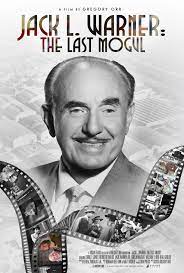
JACK L. WARNER: THE LAST MOGUL
US, 1993, updated and re-edited 2023, 100 minutes, Colour.
Directed by Gregory Orr.
This documentary, written and directed by Warner’s grandson, from Warner’s adopted daughter, tells a personal story as Well Is the history of the Warner Bros and the history of the studio. On the occasion of the centenary of Warner Bros, 2023, the director has re-edited his documentary and updated it. At the same time, there was a four part documentary series, The History of Warner Bros, narrated by Morgan Freeman, highlighting the different phases of Warner Bros, ups and downs, the range of movies produced, the various owners of the studios, the impact of television, a very complimentary documentary indicating that the studio had always supported casts and projects.
There are also some criticisms, especially of Jack L Warner.
This documentary is worth seeing insofar as it offers an entertaining story. However, there are a number of criticisms, especially of underestimating the clashes between the brothers, the character and behaviour of Jack L.Warner himself, the messiness of his first marriage, the alienation of his son who appears throughout this documentary. Another criticism is that it would have been very interesting to know more about Warner’s falling out with producer Darrell Zanuck who went on to 20th Century Fox and Hal Wallis who had a very successful career as a producer after leaving Warners.
The film is narrated by Efrem Zimbalist Jr. It has a great number of talking heads, stars reminiscing, authors who have written on aspects of Warner Bros history.
There is the discovery by the brothers of the movies, moving to Hollywood, the initial movie scene 1923, the risks with Vitaphone, the use of sound, The Jazz Singer, the successes in the 1930s and the gritty crime dramas, along with the clashes with stars about contracts, rebellions, as Well Is the fostering of stars like Errol Flynn. The film shows how Warner Bros adapted over the decades hiring, the moves to Seven Arts, changing partnerships and ownerships.
While there is the personal story of Warner and the clashes with his brothers, and glossing over of his divorce from his first wife, the strong presence of his second wife, his womanising, Warner, in retrospect, was the most successful and long-lasting of the initial Hollywood moguls, the Jewish refugees from programs in Europe, the new life in America, poor, business sense, success – and some fulfilment as well is contributing to the American dream.
Asteroid City
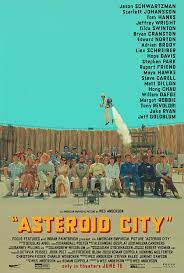
ASTEROID CITY
US, 2023, 108 minutes, Colour.
Jason Schwartzman, Scarlett Johansson, Tom Hanks, Jeffrey Wright, Tilda Swinton, Bryan Cranston, Edward Norton, Adrien Brody, Liev Schreiber, Hope Davis, Steve Park, Rupert Friend, Maya Hawke, Steve Carell, Matt Dillon, Hong Chau, Willem Dafoe, Margot Robbie, Tony Revolori, Jake Ryan and Jeff Goldblum.
Directed by Wes Anderson.
For almost 30 years, writer-director, Wes Anderson has been making very personalised, idiosyncratic films. And he has won quite a reputation. Even when his drama/comedies seem realistic, there is so much about the characters, the situations, the dialogue which seems quite surreal. And this has been a strength, fascinating, intriguing. Fans of Anderson will have their own favourites, this reviewer will quote The Royal Tennenbaums and The Grand Budapest Hotel. Difficulties with some of the other films, The Fantastic Mr Fox, The French Dispatch.
While most of Anderson’s films have been live-action, he has made to animated films, Mr Fox as well as Isle of Dogs. With Asteroid City, he has combined both talents. The pastel backgrounds for locations belong to animation. And the cast, performing in front of these locations more often resemble characters in animation. And, even more tantalisingly, Anderson has created quite a theatrical background to his staging of these events of 1955 in the Nevada desert. In black-and-white scenes, he shows the discussions about putting on the play, interviews with the producer, the director, the continued commentary from Bryan Cranston, seeing the actors and their interactions with writer and director, discussions about their roles, even actors discussing a sequence omitted from the final cut but spoken by them. So, a moving backwards and forwards, from colour to black and white, from Asteroid City to the theatre. It is all very clever and can be admired (though those frustrated by the complexities have commented that it is too clever for its own good).
As mentioned, Bryan Cranston is the TV host/commentator throughout, with Edward Furlong as the writer, Adrien Brody as the director, Willem Dafoe as the acting coach, Margot Robbie is the actress whose scene was cut.
However, out in the desert with echoes of the testing of atomic bombs, there is a convention for up-and-coming scientists to receive awards. Asteroid City is where an asteroid landed 3700 BC. There is a service station, Matt Dillon alone at the pump. There is a motel, managed by Steve Carell. The principal dramatic focus is a war-photographer father with his son and three daughters whose wife has just died and he can’t tell his children (Jason Schwartzman), his sometimes irascible father-in-law (Tom Hanks). General Gibson (Jeffrey Wright) is presiding, Tilda Swinton as the local astronomer, a teacher (Maya Hawke) with a bus full of children, a musical band, the families of the candidate children, and a famous movie star with her daughter (Scarlett Johansson). One might say: who could ask for anything more!
While there is the central core of the Convention, the awards, interactions in the town, the screenplay is more or less a succession of sketches (including a close encounter of the third kind and a cartoon alien who steals the local asteroid). The father and the movie star bond. The youngsters bond even more. The general is in touch with Washington and everyone is quarantined in Asteroid City.
So, if those ingredients sound attractive, Asteroid City will be an enjoyable Wes Anderson entertainment.
1. A Wes Anderson film? His reputation, style?
2. The structure of the film, the background, the theatre, putting on a play, discussions between director and cast, between writer and cast (and a relationship with one of the stars), the drama coach, complexities behind the scene, logistics, the actor and actress whose scene was cut and their reciting it? The commentating by Bryan Cranston, entering into scenes, sometimes wrongly and exiting? The effect of this theatricality and its relationship to the drama of the film?
3. The structure of the film, the desert, the pastel and artificial backgrounds, Convention Centre, motel, gas station, the streets, the motel, people looking out windows…? The equivalent of animation?
4. The 1955 setting, the Eisenhower era, UFOs and aliens, the testing of bombs? Remote desert communities and their livelihoods, tourists, conventions? The family driving in with the car, the breakdown, the mechanic and his trying to help? The motel and the manager, selling plots of land in the desert, investments…? The busload of children? The children as aspiring scientists and the Convention, awards? The various families, domestic incidents, meals, showers, conversations? The movie star?
5. Audience response to the various characters, the episodes, the interactions?
6. The family, the father of the war photographer, the death of his wife, unable to tell his children, his young son, scientist, for the award, the three little daughter’s, precocious, the issue of burying the with their mother? The grandfather, his clash with his son-in-law, fostering his children?
7. The other families, parents, children, quarantined in Asteroid City? The film star, her reputation, the woman’s criticism of her role not being liked, her interactions with the father, the motel, the windows? With her daughter and her relationship?
8. The general, his speech, his assistant, the awards, the history of the city, the UFO, the alien, the stealing of the asteroid, checking with Washington, imposing quarantine, his being lifted, re-imposed…?
9. The children, science, knowledgeable, compared with the adults? The visit with the astronomer, the scientific background? The awards?
10. The teacher, the bus full of children, precocious comments, the lessons, the interrupted, experiencing the alien?
11. The band, travelling, Montana, attraction to the teacher? The dancing?
12. The alien, close encounters, cartoon alien, taking the asteroid, the later return of the asteroid? The alien embodied in Jeff Goldblum at the end?
13. The aftermath, the general’s death in the accident, the dispersing of the people, the father and the film star and the address, the future?
Photo album, 20 years in Vietnam, Mass and Lunch
Photo album, 20 years in Vietnam, Mass and Lunch
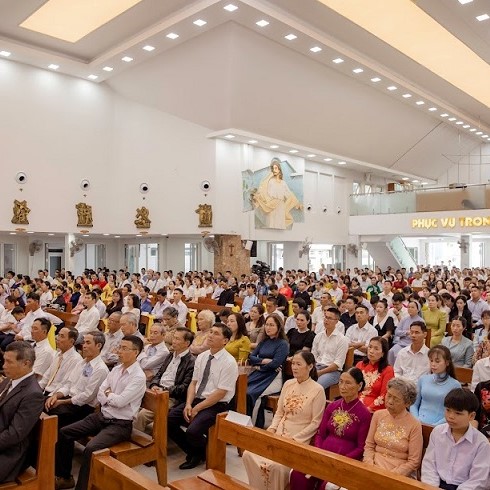
On The Solemnity of the Assumption of the Blessed Virgin Mary (August 15th), the MSC Community in Vietnam celebrated its remarkable 20th-anniversary establishment at Thanh Da Church.

Also in this same celebration, 9 of our MSC Brothers made their perpetual profession to consecrate their entire lives to God as MSCs.

Attending the celebration were our Chevalier Family:
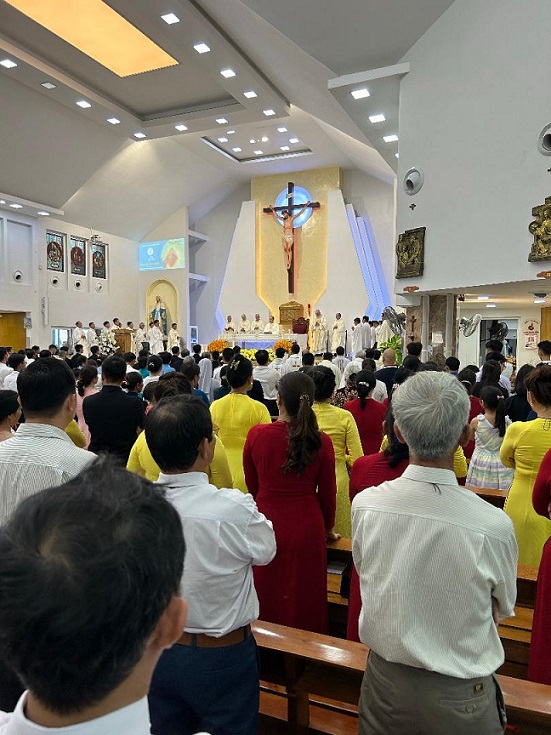
the MSC Priests and Brothers (from Australia, the Philippines, Indonesia and Vietnam), the MSC sisters, the DOLSH sisters, Lay MSCs in Vietnam and Mark McGinnity from Australia,
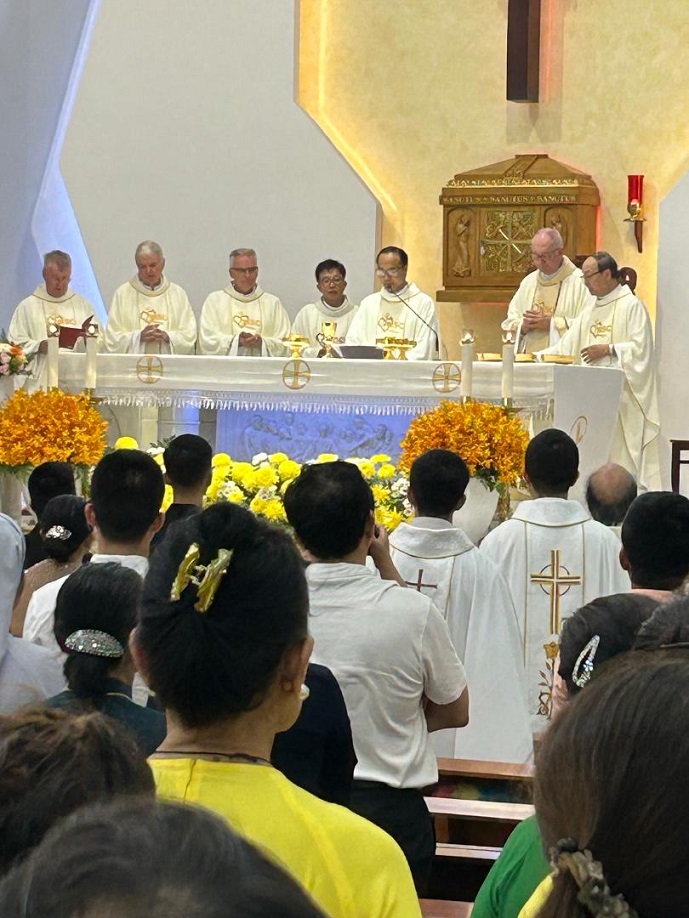
alongside with many other Priests from different dioceses, religious men and women from other Congregations, the MSC's family members, benefactors and friends.
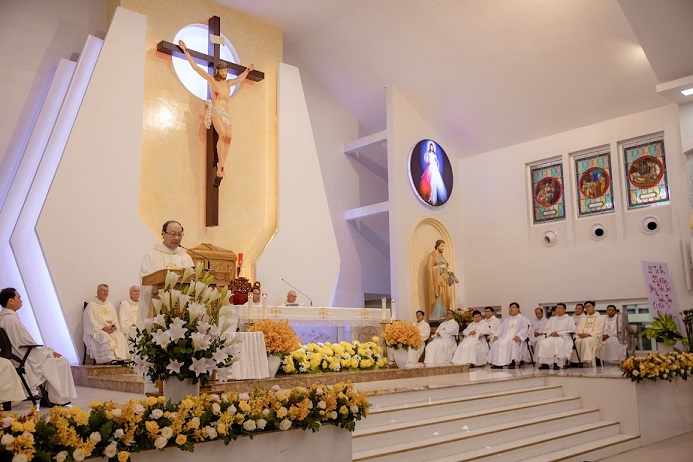
The 9 brothers made their Perpetual Vows before Fr. Provincial Stephen Hackett, MSC, the delegate of the Superior General, with the witness of Frs. Robert Irwin, MSC and Thoi Tran, MSC and in the presence of the whole community gather in the celebration.
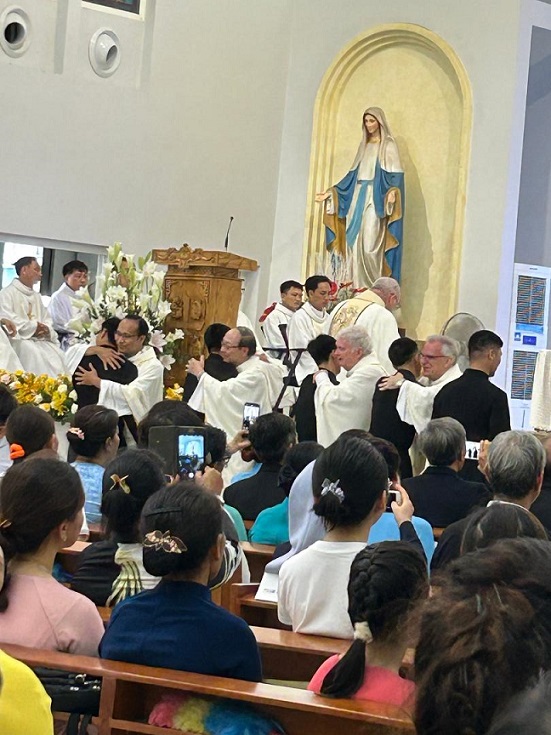
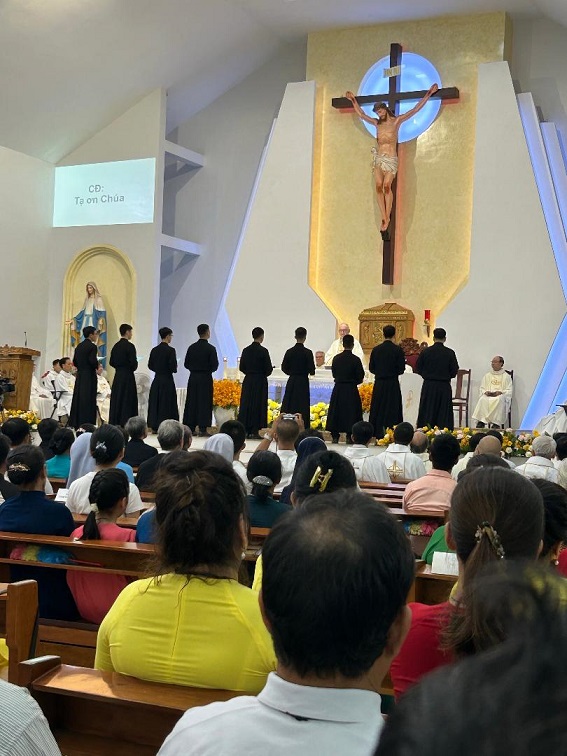

After the Communion Prayer, Fr. Chris McPhee and Fr. Stephen Hackett shared their thoughts and hopes for the MSC Vietnam and expressed gratitude to all those who have been contributing to the growth of the MSC in Vietnam.
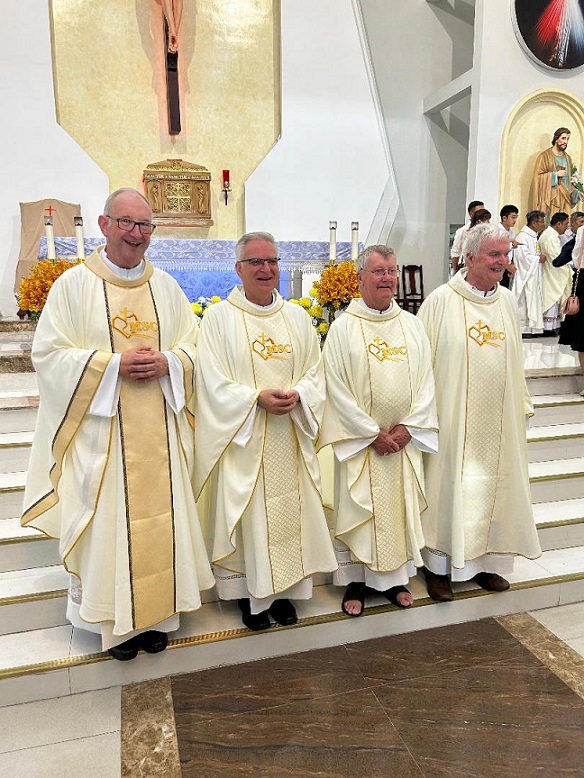
Shortly after the Mass, we shared with one another a warm and happy agape meal.

We really much enjoyed the company of each other with music, dances, interviews, talk and lots of laughter.

MSC sisters
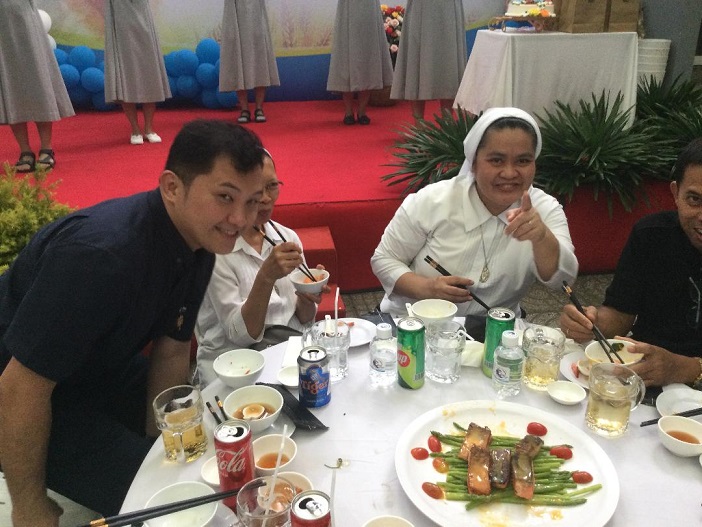
Andrew Paparang MSC, Indonesia, former director of students
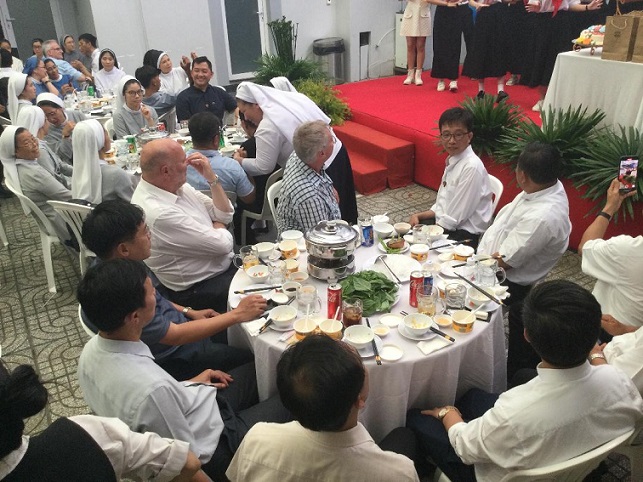
With Mark McGinnitty, MSC Education, John Mulrooney
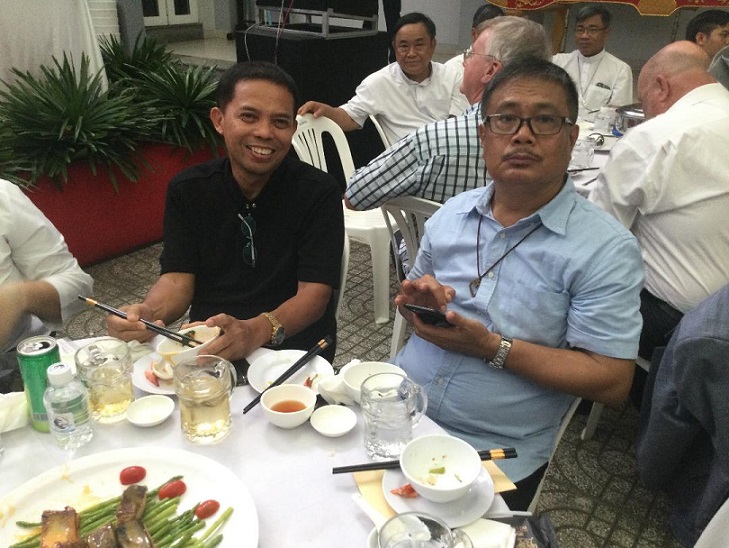
From the Philippines, James and Gene Pejo, former Provincial and Novice master for many of the Vietnamese students.
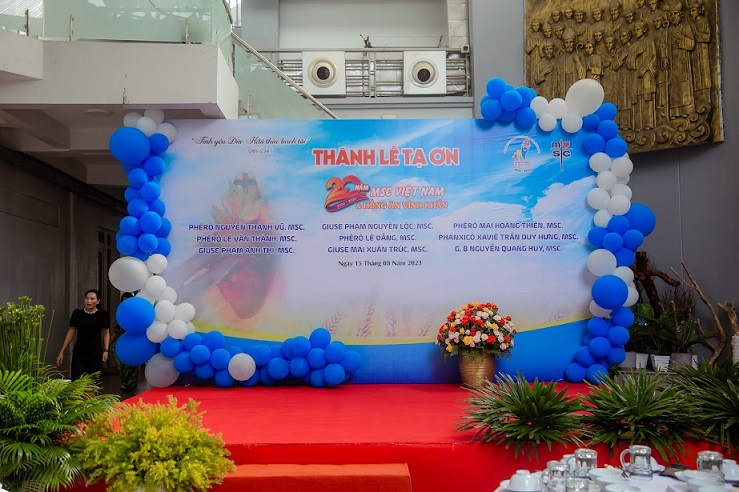
By Vietnamese MSC’s Communication Committee
About my Father
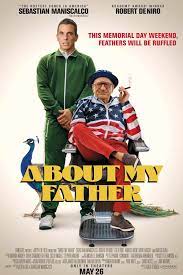
ABOUT MY FATHER
US, 2023, 90 minutes, Colour.
Robert De Niro, Sebastian Maniscalco, Leslie Bibb, Kim Cattrall, David Rasche, Anders Holm, Brett Dier.
Directed by Laura Teruso.
American television audiences may well be familiar with Sebastian Maniscalco. Perhaps not so widely known outside the US. But, this is his film, co-writing, the main star, keeping his own name, a story based on his own father and his growing up. It runs for 90 minutes. It can be described as a light comedy. And it works happily within this framework.
This is a film about family with an oft quoted Italian saying that family is all. In fact, this is a film about two families, quite contrasting, Sicilian migrants in the 1950s, a wealthy family descended from the Mayflower pilgrims.
Sebastian narrates the story, from the vantage point of middle age, growing up with his father, Salvo, his mother sadly dying, his father a renowned hairdresser in Chicago, Sicilian to the core but coming to America to live the American dream, the migrant experience, serving in Vietnam, making a success of his life, a hard work ethos, happy within his limited world and suspicions about wealthy American families.
The great advantage of the film is that he is played by Robert De Niro, clearly enjoying himself, variation on various performances over the more than 50 years he has been top lining the movies. And, Sebastian Maniscalco and De Niro play well off each other.
But, the complication is that Sebastian is in love with Ellie, Leslie Bibb. Salvo is wary, Ellie is not the kind of Italian fiancee that Salvo expects. Come 4th July holiday, Ellie invites Sebastian to her parents’ luxurious home and the local country club. Sebastian, tormented, worrying one way or the other, persuades his father to come. What follows, of course, is a whole lot of comedy, some slapstick, some farcical, Salvo as the fish out of water with the wealthy, the wealthy parents indulging their eccentric sons, the father an owner of a string of top-class hotels, the mother an aggressive Senator for Maryland (played by veterans David Rasche and Kim Cattrall).
On the one hand, the point is just to sit back and enjoy the comedy of errors. On the other hand, we are asked to give serious attention to the role of parents, protective, wanting the best for their children, but holding on to them for too long, the need for independence for children and to fulfil their own dreams rather than their parents’ dreams.
One might say that a lot of the comedy is fairly silly but, given the cast, enjoyably silly. (We have never seen Robert De Niro participating in an egg and spoon race before!) Things do get serious towards the end but there is a happy and proper ending. (Those who know Italian will get the joke about the peacocks when they hear that De Niro’s dinner recipe mentions Pavone – and we have seen the strutting peacocks in the grounds. And the final humorous joke about the peacocks pays off!)
- The straightforward title? The focus on “my” and the autobiography aspects from comedian Sebastian Maniscalco? The Sicilian origins, his father a migrant, the American dream, the effect on the next generation and independence, parental expectations?
- Sebastian Maniscalco and his comic talent, his career, cowriting the screenplay? Robert de Niro, his career in comedies, meeting Maniscalco’s father for his performance?
- The Italian migrant background, Cicely and its reputation, memories of The Godfather? The generation coming in the 1950s? Salvo, hairdresser, his reputation, his clientele, admired? The death of his wife? Pride and his son? His expectations for his son? The narrow culture and perspectives? Wary of WASP culture?
- The contrast with the descendants from the Mayflower pilgrims? American pride, wealth, business, mansions, manners, country clubs?
- The situation, Sebastian, his work and skills, his relationship with Ellie, the scenes together, a middle-aged couple, marriage plans? Living in Chicago? Wanting to stay there? Sebastian and his work at the hotel? Ellie and her art, the exhibitions, her paintings, so similar, all being bought?
- The comic touches with Salvo, the scenes in the hairdressers? At home?
- The introduction to Ellie’s family, her mother the senator, aggressive? The father, his owning all the hotels, expansion? The older son, unreliable, drugs? The younger son, new age obsessions and behaviour?
- 4th July, holiday and ethos, the plan, Sebastian’s dilemma, eventually inviting his father? The contrast between Salvo and Ellie’s parents and family? The comedy of the helicopter ride – and the later acceptance?
- The visual and verbal comedy with the clashes of culture? The country club style, meals, connections, conversation, the touch of patronising, dealing with the sons? Ellie, her reaction, wanting the families to unite? Her dismay when she discovers that her father had organised the buying of all her paintings and putting them in the hotels?
- The ups and downs of the visit, the comedy, the sports and the egg and spoon race, Sebastian and his desperation, the meal, the pastor, Pavone and the audience seeing the peacocks? The realisation of the peacocks in the pastor? The senator, the need for the interview and hairdo, Salvo and the effect on her hair, her explosion, the media and aggressive interview, social media liking the hairdo and her change of heart?
- Confrontation between father and son, the father leaving early? The son desperate, going to the airport, getting his father to return?
- Ellie, the same issue of independence, the pressures from her father?
- The resolving the crisis, mutual understanding, the change in the parents, Ellie’s two brothers and the effect on them? A future?
Tip of the Iceberg/ La Punta del Iceberg
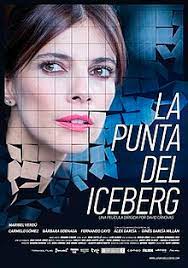
THE TIP OF THE ICEBERG/ LA PUNTA DEL ICEBERG
Spain, 2016, 91 minutes, Colour.
Maribel Verdu, Carmelo Gomez, Fernando Cayo, Barbara Goenaga.
Directed by David Canovas.
This is a comparatively brief but very interesting film, especially for those concerned about business, management, pressures on executives, on staff.
The film opens with pressure on an executive who then kills himself. It is revealed that two other executives have killed themselves in the office building. One of the rare female executives, Sofia, played by Maribel Verdu, tough in herself, even to firing her sister-in-law for not being effective in her job, her commission to go to the office to examine the situation, do interviews and write a report.
The bulk of the film is Sofia and her interviews, with a range of people, the overall executive in that office being very dominating, further revelations about his bullying, having videos (surveillance cameras in all the major rooms), blackmail and pressurising for better results. As she listens, especially to Gabriella, revealing aspects of liaisons in the office, pregnancies, further pressures, she visualises the suicides and the effect on her.
Ultimately, she writes a report but looks at the USB stick, with many videos from the surveillance cameras, used for bullying, for blackmail and pressurising. She then confronts the board, their refusing to act, her being fired, her going home and facing the moral issues and making a decision to make contact with the press who had initially asked for an interview with her.
Quite intense at times, but raising significant issues of business management and human resources.
- Title? Business management? Mismanagement, power and domination?
- The Spanish setting, the visuals of significant buildings, externals, interiors, offices, interview rooms…? Homes? The musical score?
- The introduction, Marcello, the discussion, threats, his manner, suicide? The revelation of the other suicides? The executive shooting himself in his office? The executive cutting his throat and the bathroom? The final suicide of Gabriella, falling from the roof?
- The exploration of pressure in big business, command and control, exploiting, blackmail, suicides?
- The introduction to Sofia, the interview with Enzo, the influence of the head, the internal investigation, her being sent to do the report? Her background, ruthless, firing her sister-in-law and the reasons? Her reputation?
- Travelling to the office, the interview with the director, his attitudes, controlling, treatment of severe? her being given the office of Marcella? Her personality, control, stern, the interviews, handling different people, Gabriella, the discussions, the truth, the USB stick? The visualising of the suicides of the men and her contemplating them? The interview with Alejandro, the past contact, his being in Germany, womanising, the return, the unions, the interactions between them? The encounters with Jaime, his attitudes, in a hurry, the vending machine, the later meetings, the effect of the meetings on her?
- The writing of the report, Gabriella, the videos, her reaction, confrontation with the head? Her return home, tearing up her report, the impact of the videos? Integrity?
- Going to the meeting, entering without invitation, handing out the reports, the men, exclusively men, reading the reports, Enzo and his reactions, the head, the indication that nothing would happen, business interests? Sofia and her denunciation, her exclusion, firing? Going to see her sister-in-law, the apology?
- The moral dilemma, reassessing her own attitudes, integrity, the phone call to Jaime, the future and the media, investigations?
Filip
FILIP
Poland, 2022, 125 minutes, Colour.
Eryk Kulm, Victor Mertelet, Caroline Hartig, Zoe Straub.
Directed by Michael Kwiecinski.
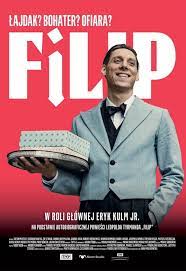
Filip is yet another World War II story, but a story with a difference. It is based on an autobiographical novel.
This is a Polish film and it opens in 1941 and the Warsaw ghetto, the Jews herded together but surviving, dramatised by the music hall sequence, enthusiastic singing, and excited audience, with a sudden invasion, shooting, many dead, including the fiancee of the central character. The audience is left with this atrocity and emotional response.
There is an immediate transition to Frankfurt in 1944. Filip is now a waiter in the Park Hotel, along with a number of other foreigners who have been accepted as workers in Germany. They have a Polish liaison who is able to get the documentation and keep them in work – though, it is shown that there is great pressure on him and he eventually takes his life.
While there is talk of war, especially the women whose fathers, husbands and sons are away on the front, life seems to be ordinary in Frankfurt. The hotel is functioning even if there is some rationing. The audience sees the life of hotel, the work of the waiters, the rather poor accommodation, the friendships they have developed. But, there is something different with many of the waiters – sexual liaisons with the German women, and some men.
Filip seems to have changed since his Warsaw days, keeping fit with continued exercise, doing his job, making friends, but, the audience soon realises, Filip taking advantage of his situation to wreak some revenge on the Germans, especially in seducing and humiliating women. He and his friends go to the swimming pool, tantalise women, begin some affairs but Filip humiliating the women, especially a young woman about whom he makes a bet that he can seduce her and turn her into a prostitute.
However, all is not easy, some of the waiters are found out, humiliated, shot. And, by contrast, Filip is attracted to the young woman he intends to humiliate, keeps meeting her, conversations, falling in love and she with him. They plan to leave for Paris – but the situation is changed because of aerial bombardments of Frankfurt.
The film turns grim, the preparation for a lavish wedding at the hotel, the return of a Polish woman to the hotel with whom Filip had a relationship, her head being cut because of her relationship with the Germans. And, his close friend, Pierre, is also humiliated. Then the film turns rather more desperate than anticipated, Filip breaking down at the death of Pierre, telling everyone that he is Jewish and Polish, the officials choosing not to believe him but that he is overcome with grief. There is a most powerful sequence with Filip groaning his grief. He gets her gun, shoots of the guests at the wedding, makes his escape to the railway station, confronts the girl and denies any love for her, telling her of his bet. He then descends the stairs to go to the train for Paris.
A grim reminder of the reality of war – but even more of the effect of war and brutality on individuals.
- A different World War II story, Polish perspective, German perspective? Based on an autobiographical novel?
- The tone with the opening in Poland, the Jews in the ghetto, the celebration, the singing, the audience, with the stars and Jewish indications? The German attack, opening fire, the brutality of the deaths? Filip in this context, his relationship with Sara, the family, grief at her death?
- The transition to Frankfurt, 1944, the city, the streets and buildings, the Park Hotel, the interiors, dining area, kitchen, rooms for the staff? Atmosphere? The musical score?
- The story of Filip, his age, Polish background, Jewish background, pride in his heritage, the death of his family, the death of Sara? His work at the hotel, the group of waiters, the range of staff, the foreigners, allowed to work? The rooms? Their freedom? The contact with Staszek, his keeping the group in work, the documentation, his own attitudes, drinking, depression, killing himself? The precarious lives of the waiters? But their being available for sexual encounters with the German women?
- Filip, his moving to Frankfurt, his French name, speaking French with the waiters, ability to speak German? He encounters with the women, the wives, brutality, the woman at the swimming pool picking him up, wanting to speak in Polish, his derogatory comments, his humiliating her? His revenge in humiliating the women? The relationship with Blanka, her Polish background, with the other men, with the German official, returning, depending on Filip, on Pierre, her head being shaved? Pierre supplying the wine, Filip bringing it to her?
- The bonds between the waiters, the details of their service, the head waiter and treating them like his troops? The differing personalities, the young waiter and Filip supporting him, Francesco, Italian, with the women, his being taken, insulted, shot? Pierre, with the women, with the officer? His support of Filip?
- Filip, the frequent scenes of his exercise? His swimming, pursuing the women? The encounter with his schoolmates, her German background, taunting him, his silence, her request to keep the room, the consequences?
- Observing Lisa, the bet with Pierre, in the water, her disdain, pursuing her? Her age, work in photography, the sketches, Filip pursuing her, her falling in love, the outings, the time together, the sexual encounter, Filip loving her, the dangerous situation, the aerial bombardment of the city, the return from the railway station, things going back to normal, Filip affected by Blanka and the death of Francesco, the threat to Pierre, his outburst, declaring he was Polish and Jewish, this being interpreted as grief? His going to Lisa, his harshness towards her, telling her of the bet?
- The impact of the single take of his grief, continued howling?
- The shootings, Filip getting the gun, on the balcony, the random shooting, the dead? His walking away?
- The finale, his going to the railway station, getting his passport from Staszek, at the station, directed towards Paris train?
- A different angle on Germany, 1944, ordinary life in the city, certain freedoms, even for foreigners, the wealthy, the preparation for the dinner and the celebration, swimming pools – and the women, but their husbands and members of the family at the front? Polish refugees and revenge?
Infinite
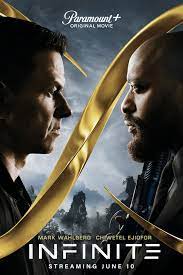
INFINITE
US, 2021, 106 minutes, Colour.
Mark Wahlberg, Chiwitel Ejiofor, Sophie Cookson, Dylan O'Brien, Jason Mantzoukas, Rupert Friend, Toby Jones, Johannes Haukur Johannesson, Liz Carr, Tom Hughes.
Directed by Antoine Fuqua.
Infinite is a combination of action show with more science-fiction philosophical conversations.
The presupposition of the plot is that there are people who, with reincarnation, retaining memories of the various lives they have lived. The group who are positive in outlook, wanting to better the world, are called Infinites. However, there is a group bent on destruction called the Nihilists.
This is a star vehicle for Mark Wahlberg, rather more stonefaced and serious than usual, but excelling in the action sequences. He is an Infinite but who has lost his memories, considered schizophrenic as he was growing up, skilled at making expert swords, selling them to gangsters in exchange for medication for his condition. On the other hand, there is a suave Nihilist, Bathurst, played by Cbiwitel Ejiofor.
The film actually opens with a very long car chase, quite expert in its drama. The driver is Treadaway (Dylan O’Brien) pursued by a younger Bathurst (Rupert Friend). There is also another car with two Infinite’s. The chase ends in tragedy and deaths and some spectacular stunt work.
In the present, it emerges that Mark Wahlberg is a new incarnation of Treadaway and the next generation of Bathurst arrests him, interrogate him, tests out his memories or lack of memory – but Treadaway is rescued by the woman in the previous sequence who explains the situation to him, get him to a centre where is memories can be restored. A strong supporting cast, led by Toby Jones, dramatises the range of Infinites and those who have a capacity for restoring memories.
This continues his pursuit, malevolent and intending to destroy, spying on Treadaway and his transformation – and the goal of getting the key device, The Egg, so that he will have the power. The scene shifts to Scotland, to Bathurst Castle, an invasion by Treadaway and Nora, the revelation of where The Egg was concealed.
The climax, which might make Tom Cruise in his mission impossible persona quite jealous, has Treadway riding a bike, up a mountain and landing on the wings of the plane (Cruise did a similar stunt but landing on a train roof in Dead Reckoning). The scenes on the wings on the plane and the struggle with Bathurst and the final freefall and struggle is quite spectacular.
An epilogue in Indonesia, a young man making a sword, martial arts champion – the next reincarnation. Direction is by Antoine Fuqua expert in crime dramas, many with Denzel Washington.
- The title, the premise, Infinites wanting to save the world, Nihilists to destroy it? The tradition of films in this science-fiction vein?
- An action film, the number of car chases, fights, special effects, confrontations, the final episode on the wings of the plane? The contrast with the science-fiction ideas, statement of premises, reincarnation, identities, memories?
- The opening in New York City, introducing characters, themes, the chase? The transition to the present? Treadway, his apartment, waking, sense of identity, schizophrenia, forging the sword, going to the gangsters, the confrontation, the pills, the fight? Chase, his being arrested, the confrontations with Bathurst? The interrogation, the emblems, the suggestion of memory? His being rescued by Nora?
- Treadway, his character, loss of memories? The conversations with Nora? Explanations? The flight, the remoteness? The encounter with the various Infinite’s, explanations, tests, the attempts to recover his memory? The various members of the group and their contributions? His being taken to Artisan, the club, his hedonism, personality, explanations, his role in reviving memories, the dangerous process?
- Bathurst, the confrontation with Porter, information, Porter’s resistance, death, the memories and personalities kept on file? Bathurst and his collection? His henchwoman? The decision to go to Scotland? His spying, getting the information about The Egg? Summoning the plane?
- Treadway, recovering his memories, the flashbacks and his concealing The Egg before his death? The contact with Nora and Abel? Coming to Scotland, the weapons, the military, the fights? Bathurst and his escape?
- Treadway, on the motorbike, over the cliff, onto the wing of the plane, his attempt at sabotage, the final confrontation with Bathurst, the fight, recovering The Egg, into the sea?
- Time passing, Indonesia, the epilogue, the new incarnation of Treadway, of the other characters? Artisan and his supervision?
- The themes, plausibility, interest?
Chevalier. 2022
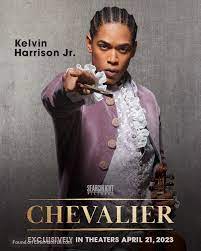
CHEVALIER
US, 2022, 108 minutes, Colour.
Kelvin Harrison Jr, Samara Weaving, Lucy Boynton, Ronke Aekoluejo, Martin Csoakas, Alex Fitzalan, Minnie Driver, Sian Clifford, Henry Lloyd-Hughes.
Directed by Stephen Williams.
Perhaps an interesting question for a music trivia evening might be “who is Joseph Bologne and when did he live?”. For more than two centuries he has not been well-known or documented. However, he and his reputation have emerged in more recent times.
The answer is that Joseph Bologne was a talented musician-composer, an expert violinist in Paris in the years prior to the French Revolution. So, why is he not so well-known? The immediate answer is that he was born in Guadalupe, his father a French plantation owner, his mother a local slave. He was black. And, while he did achieve a great deal of success, ultimately his racial background was against him.
This film opens quite dramatically, a fictitious account of Mozart playing his violin in a Paris concert, Joseph Bologne walking up the aisle, challenging Mozart to a violin duel, showing his virtuosity, the audience rising in excited applause. He was also an expert fencer, defeating an aristocratic challenge, impressing Marie Antoinette and his being dubbed Chevalier de Saint-Georges. He becomes something of a toast of Paris, spurning the advances of an ageing diva, Minnie Driver, but ambitious to be the new Director of the Paris Opera.
Kelvin Harrison Jr gives an accomplished performance as Joseph Bologne, memories of his being brought by his father to Paris when very young, admiring his skill with the violin, paying for him to be educated but his being bullied and mocked. Now he is a man of pride, even arrogance, presumptuous about his talents and where they could lead him. He composes an opera, Ernestine, and it is produced, a talented young singer, Marie Josephine (Samara Weaving), taking the lead despite her dominating Count-husband (Marton Csokas) forbidding her. And a liaison ensues. The main competitor for Director of the Opera is the composer, Christophe Gluck. Given present society before the revolution, colonial attitudes, racist superiority, it is not a surprise who wins!
This is quite a lavish production, the period being beautifully re-created, costumes, décor, lighting, atmosphere. But, there are revolutionary rumblings, Marie Antoinette out of favour (and the Chevalier turning against her because of the Opera house decision), Joseph Bologne supporting an aristocrat friend who supports the revolution, composing a concert to support the revolutionary movement, leading to a confrontation with the count, who threatens to break the violinist’s fingers.
The film gives some information as to what happened after this period – but the film also provides the opportunity for audiences to hear some of the Chevalier’s classical compositions. Audiences will enjoy this visit to 18th century Paris.
- Audience knowledge of Joseph Bologne? His life, his music, his career?
- The portrait of a musician, the incorporation in the film of some of his music, his origins, plantation owner father, Guadaloupe slave as his mother, brought to Paris, his father leaving him, to be educated? His skills with the violin? Education, bullying, standing his ground? His skills as a fencer and the demonstration, Marie Antoinette watching? His skill as a musician, the duel with Mozart with the violin? The immediate acclaim and enthusiasm from the audience?
- His skills and recognition by Brazilian society, the issue of race, the issue of colonialism? His being despised? His being feted? His title of Chevalier? The support of his close friend?
- The question of the leadership of the Paris Opera, his ambitions, talent, with Marie Antoinette, the clash with the diva and her enmity, the encounter with Marie-Josephine, her singing, her husband? The encounter with Gluck, his talent, connections, nominee for the leadership of the Opera? Each of them composing an Opera?
- Joseph, the link with Madame Diginnis, her assistance, Josephine and the rehearsals, falling in love, the sexual encounters?
- The marquis, his personality, reputation, military, marriage to Marie Josephine, domination of her, forbidding her to sing, his long absence? His return, the confrontation, treatment of his wife, relegating her? The confrontation with Joseph?
- The writing of the Opera, Ernestine? The help, his friends, the performance? Success? Gluck, his Opera, the performance? The audiences? Marie Antoinette? The committee, the meeting, the judgement, the races, the decision for Gluck? The news for Joseph, his reaction? The influence of the diva?
- Audience knowledge of Marie Antoinette, the foreigner, Queen, the week Louis XVI, her influence, society, patronage of Joseph, the change, cautious for her reputation? Joseph turning against her?
- Philippe, nobility, get on the side of revolution, his meetings, Joseph attending the meetings, agreed to do the concert in support of the revolutionaries? The return of the marquis, coming to the theatre, the confrontation with Joseph, his withdrawing?
- Joseph’s mother, absent, her arrival, her love for her son, his resentment towards her, the issue of racism, the black population of Paris and his status?
- The absence of Marie Josephine, a choice to be with her husband, her pregnancy, the encounter with Joseph, giving birth, his child, the marquee killing the child?
- The denunciation of Marie Antoinette, his removing his wing, identifying with his race, with the revolutionaries?
- The movement towards revolution, the concert, the marquis, the assailing of Joseph and the threat to break his fingers?
- Joseph, his enlistment, fighting for the revolution, his rank?
- The film and its retrospect, the rediscovery of Joseph, in the context of pre-revolutionary France, French colonialism and slavery, his skill as a musician, his musical compositions?
